Jackie Robinson Day: How Integrated Sports Changed the World
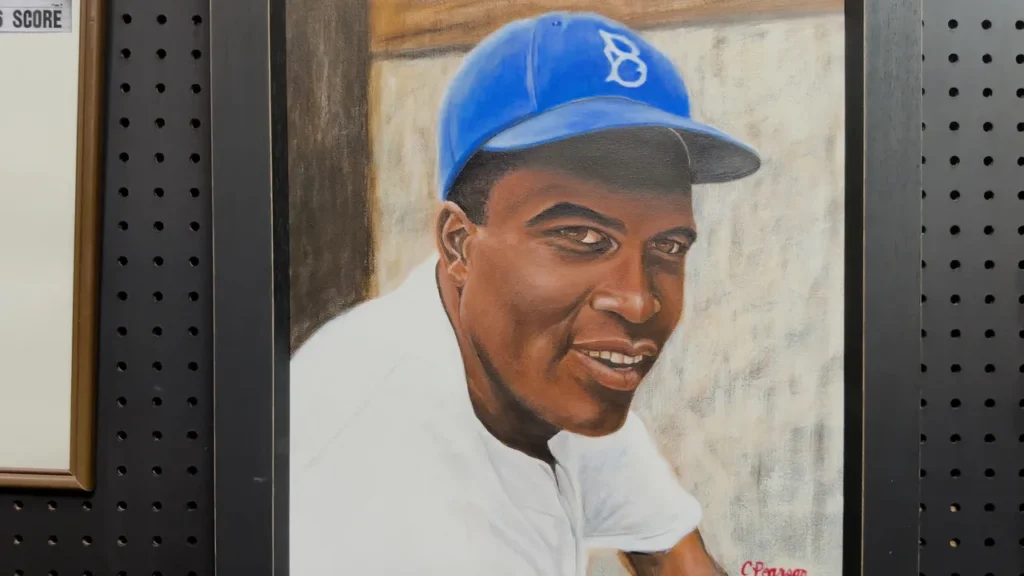
By: Grace Smith – Wise News Network
GASTONIA, NC (WNN) – In the modern era of sports, a glance at the television screen during a game can reveal a tapestry of diversity. White and Black athletes share the field. Men and women compete in the same arenas. This narrative contrasts the recent past when such scenes were unimaginable.
Until the 1950s, White and Black athletes played on different teams. On April 15, 1947, Jackie Robinson made integrated sports a reality when he broke the barriers of Jim Crow to play for the Dodgers.
Robinson changed the game for athletes across the board. Before his breakthrough in integrated sports, only White athletes could play in Major League Baseball and its affiliated minor leagues.
Black athletes had historically black baseball leagues, which initially comprised eight teams. Jackie Robinson played for the Kansas City Monarchs before getting drafted by the then-Brooklyn Dodgers.
By the end of his first Major League season in 1947, Jackie Robinson won Rookie of the Year. Despite facing opposition from audience members, other teams and some teammates, Jackie Robinson proved that proficiency in athletics transcends the color of one’s skin.
In 1949, Jackie Robinson won the Most Valuable Player award in Major League Baseball. A decade later, the Boston Red Sox would be the last Major League Baseball team to integrate. Integration in baseball paved the way for desegregation in other professional sports.
April 15 is known as Jackie Robinson Day. This commemoration honors the integration of professional sports and remembers the legacy of the trailblazer who made it possible. People of all races unite on April 15 to honor Jackie Robinson for creating a path toward modern sports.
Although Jackie Robinson died in 1972, his legacy thrives in the athletes he impacted. Specifically, other Black athletes who felt empowered to pursue their dreams in athletics after his success.
Frank McClure and Robert “Bob” Johnson are two men who grew up being inspired by Jackie Robinson. Both men are in their 70s. To some, the days of Jim Crow are a history lesson, but these men lived through segregation and can remember everything.
Frank McClure
McClure was born on October 25, 1944, in York County, South Carolina. He is the eleventh born out of 14 children and he graduated high school from Roosevelt High School in Clover, South Carolina, in 1962.
He played baseball for Roosevelt High School. McClure’s father sparked his interest in baseball, but his experiences in the Jim Crow South motivated him to persevere in the sport.
“My dad, he inspired me to play baseball, and some of the things that I saw coming up in the Jim Crow era made me want to continue to play baseball,” – said McClure.
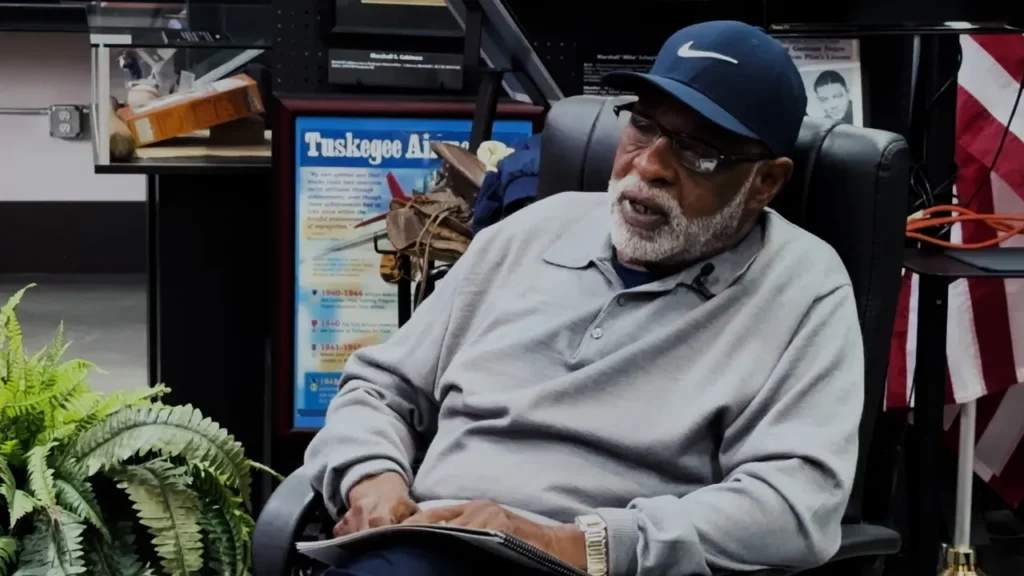
McClure detailed an unforgettable night from his childhood. At the age of 15, he worked at a restaurant and a White man used to drive him to and from work. One night, as the man drove McClure home, they noticed a bright light emanating from where McClure’s house stood.
In his yard stood a burning cross, ignited by the Ku Klux Klan. In the Jim Crow South, the KKK would burn crosses to threaten Black Americans. McClure said no one in his family knew why the KKK would burn a cross in their yard.
I couldn’t understand it. I asked the man who brought me home ; I said, “Why did they do that?” He said, “Well, that wasn’t meant for you all,” I [thought to myself], “Wait a minute, how did you know it was going to be there,” McClure recounted.
The burning cross is just one of several instances that inspired McClure to pursue a career in athletics. Some time after the cross, his home burned down and two of his siblings died in the fire.
“That caused me to persevere and it inspired me to play ball to get my mind off of different things of that nature” said McClure.
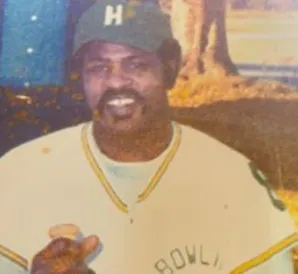
After graduating high school, he traveled to Brooklyn, New York, where he watched Black semi-pro players prosper within their leagues. Inspired, McClure would return to the South in 1964, where he would play in a semi-pro league in South Carolina.
His league was led by Raymond Hill, the father of Elmore “Moe” Hill. Moe Hill signed for the Baltimore Orioles at 17 years old. He and a teammate, Willie Gillispie, were the first Black players for the American Legion in North Carolina.
During this time, the Black athletic community may have been small, but its impact was significant. Local athletes such as McClure and “Moe” Hill emerged as role models for younger generations. For instance, “Bob” Johnson looked up to McClure as an example.
Robert “Bob” Johnson
Johnson is also from York County, South Carolina. He was in eighth grade when McClure was a senior. Johnson wanted to play baseball with the high schoolers. He admired McClure and the others on the team because they paved the way for younger athletes.
When Johnson made it to high school, he would play baseball and football. Education was important to Johnson and his family because his father, Bill Johnson, completed sixth grade before he had to drop out.
He wanted his son to graduate; however, obstacles stood in the way. Johnson remembered receiving hand-me-down books from predominantly white schools. Black students often obtained materials previously used by their white counterparts, which were often incomplete.
“A lot of books had been marked out, or pages so that you couldn’t learn the whole story” said Johnson.
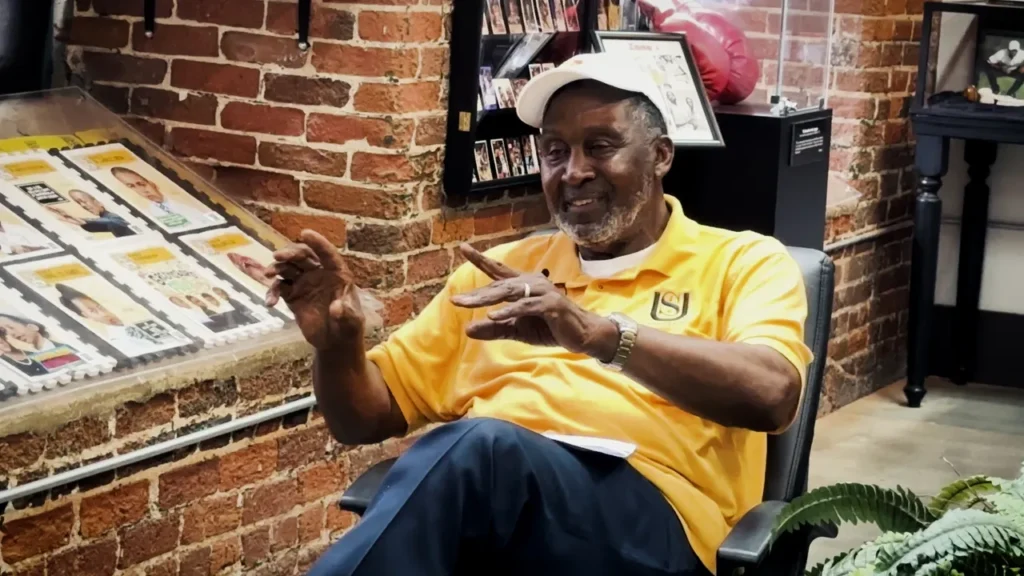
Johnson confided in his father about his frustrations with his school books. His father came up with a solution: gather the kids in his class, put all their books together, and create the full story. He credits his father’s idea with helping him get into Reid High School in Belmont.
“The first year I was at Reid High School, I became student of the year because of my education level,” said Johnson.
Reid High School was a school in Belmont that taught Black students. It was closed in the 1960s when schools were desegregated.
Johnson played football at Reid before receiving a full-ride scholarship to play football at Johnson C. Smith University (JCSU). JCSU recruited him heavily, offering two of his friends full-ride scholarships to convince Johnson to play.
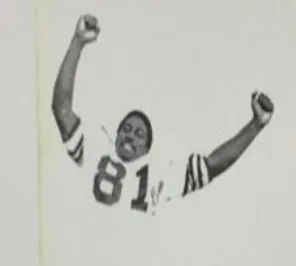
While attending Johnson C. Smith University, Johnson would major in Business Administration. Regarding football, he helped his team win a championship ring. His athletic career manifested in Johnson being drafted as a free agent by the Dallas Cowboys.
Although his time as a free agent was short-lived, Johnson continued to pave the way for his business career. His coach on the Cowboys, Tom Landry, saw potential in Johnson and helped him secure an interview with Lincoln National Life Insurance Company in Charlotte, North Carolina.
He became the first Black man hired by Lincoln National Life Insurance Company, Charlotte.
“I was the first Black man out of Charlotte to work for a white industry at that time, in 1971,” said Johnson.
Local Athletes’ Legacy
Both Johnson and McClure overcame adversity to reach their goals. A unifying driver for the two of them is their connection to religion. Their families taught them to have faith in God and he will provide.
Religion strengthened many Black families and communities during the Jim Crow era. McClure shared that his father, born at the turn of the century (1900), could rely on nothing but the Lord.
The Church became a pillar of many Black communities because it provided a sense of unity, support, and resilience in the face of systemic oppression.
“Thank God for the ministers that we had in the area at the time. They helped to guide us along the way,” said McClure.
Finding joy in predominantly white environments was another source of resilience during the Jim Crow era. Johnson shared an anecdote about a historic park and baseball field in Belmont that was open to Black people on Tuesdays, 10 am to 10 pm.
Belmont was the only city in the area that allowed Black people any time to utilize recreational facilities. Johnson said Black people from Belmont’s surrounding cities would meet at the park and find solace in each other’s company.
“All Black people went to Belmont on Tuesdays. Some met their wives there, some met good ball players there,” said Johnson, “And we danced and danced. It was good and we had so much fun.”
However, if any Black person was seen at the park any other time they would be arrested.
Jackie Robinson’s Legacy
Many things have changed in the United States since Jackie Robinson stepped into Major League Baseball in 1947. He paved the way, not only for Black athletes but for American society.
The Civil Rights Act was signed into law in 1964, federally outlawing segregation of public spaces. Jackie Robinson was a pioneer of integration, paving the way for many civil rights activists. He helped show the world that integration was possible.
Heroic civil rights activist, Reverend Dr. Martin Luther King Jr., once said: “Jackie Robinson made my success possible. Without him, I would never have been able to do what I did.”
The baseball legend lives on in the people he inspires, such as McClure and Johnson. These men, local testaments to perseverance, honor Jackie Robinson in the way they live their lives: through faith in God and personal improvement.
Jackie Robinson died at the age of 53 from the effects of diabetes and heart disease. McClure wants to teach younger generations to maintain their health, driving home the importance of screening for diseases like diabetes.
“If we get all the money and all the donations coming in, if we’re not healthy, it doesn’t do us any good,” said McClure.
In the end, if Jackie Robinson were here today, McClure and Johnson would simply say, “Thank you, thank you, and thank you.”
In that gratitude lies the acknowledgment of a debt owed to a man who changed the course of history. He helped transform the world of professional sports from an exclusionary boys’ club to the diverse and powerful industry of today.
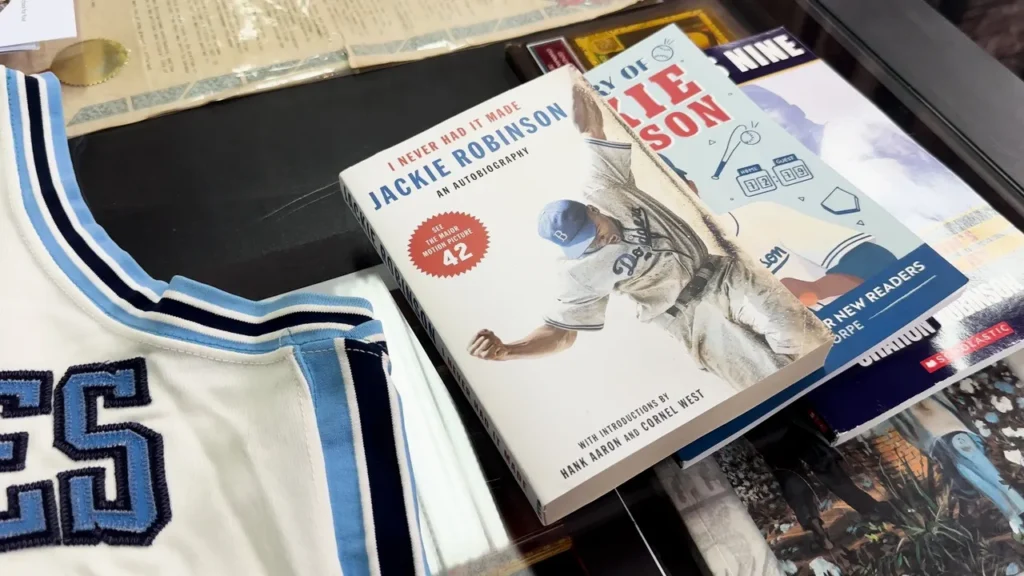
Moreover, he inspired countless individuals to produce positive change in the world. From civil rights activists like Dr. King to local heroes like McClure and Johnson, Jackie Robinson’s mark is forever imprinted on the tapestry of society, serving as a stitch of hope and progress for generations to come.
The African American Museum of History and Culture in Gastonia has joined the Tabernacle Baptist Church in Gastonia to celebrate Jackie Robinson Day on April 15, 2024, at 6:00 pm. The event will take place at the Tabernacle Baptist Church Family-Life Center.
Participants are welcome to learn about Jackie Robinson and other influential Black athletes. McClure and Johnson will join other Gaston County-area athletes to celebrate Jackie Robinson Day by sharing their stories at the event.
Jackie Robinson once said: “A life is not important except in the impact it has on other lives.” If that is the case, Jackie Robinson might have had one of the most important lives. Who knows what society would look like without him? Thankfully, we do not have to know.
Interested in attending Jackie Robinson Day? Visit Tabernacle Baptist Church-Family Life Center, 519 W 19th Ave, Gastonia, N.C., at 6:00 p.m.
For more WNN video news stories, visit YouTube: https://www.youtube.com/@wisenewsnetwork
For more WNN articles and news stories, visit: https://wisenewsnetwork.com
Contact WNN at [email protected]
Copyright 2024 Wise News Network. All rights reserved.
